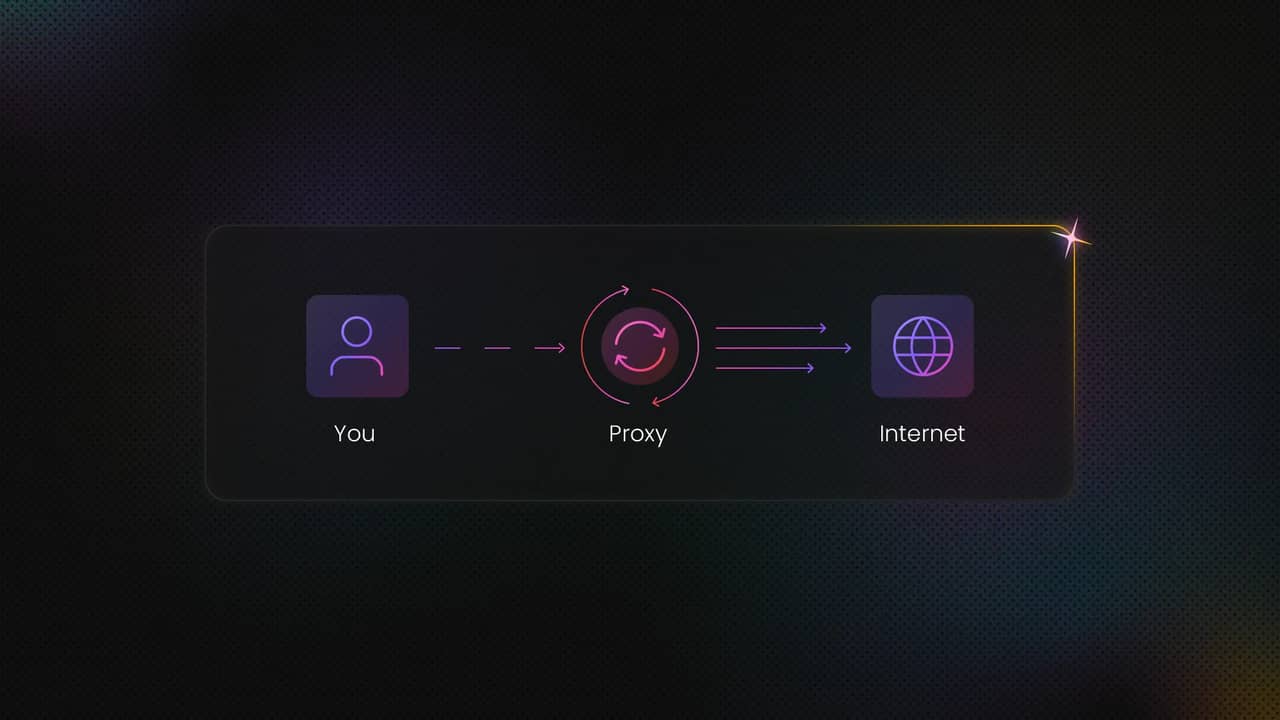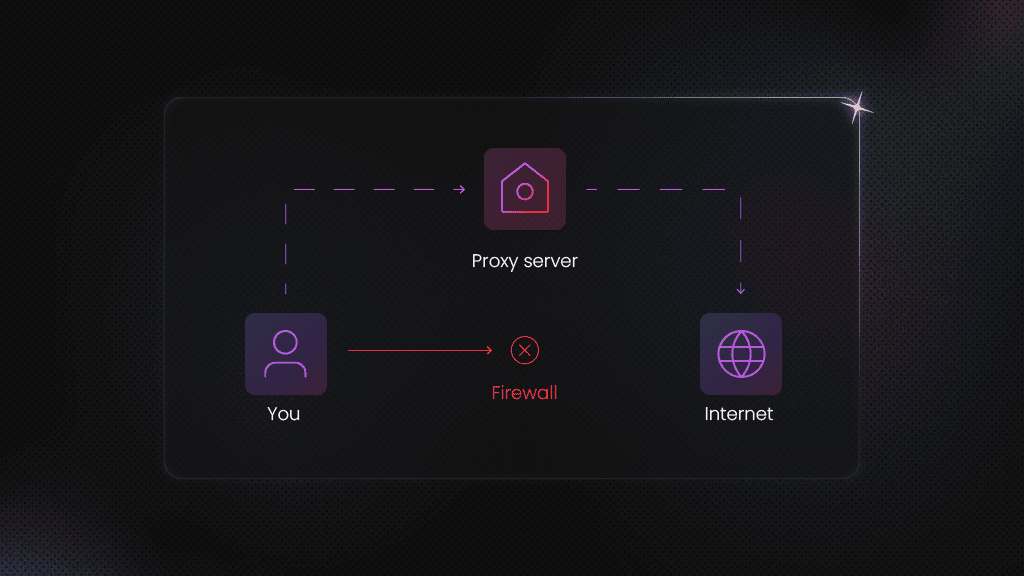What Are Rotating Proxies? Types, Benefits & Use Cases
A rotating proxy is a proxy server that automatically assigns a new IP address at regular intervals or after each connection. In this guide, we'll delve into how rotating proxies work, the different types available, and the most common use cases where they offer a clear advantage.
Dominykas Niaura
Last updated: Apr 30, 2025
7 min read

What is a rotating proxy?
A rotating proxy is a proxy server that automatically switches the user's IP address after every connection or after a set period. It ensures that each connection appears to originate from a different device or location. This dynamic IP rotation is crucial for tasks that require high levels of anonymity and can bypass CAPTCHAs, IP blocking software, geo-restrictions, anti-proxy systems, and other restrictive measures used by target domains.
Rotating proxies are commonly used for web scraping, ad verification, market research, multi-accounting, and other purposes.
Unlike static proxies, which maintain the same IP address, rotating proxies change IPs either per request or at predefined intervals.
For example, leading providers, like Decodo, offer 125M+ IPs worldwide across 125+ locations with Pay Per IP or Pay Per GB options. These proxies are available at budget-friendly rates – $1.50/GB for residential proxies, $0.32/IP for static residential (ISP) proxies, $2.25/GB for mobile proxies, and $0.026/IP for datacenter proxies.
How does IP rotation work?
IP rotation involves assigning a new IP address for each request or after a specified duration. Rotating proxies are effective for simulating numerous real-time connections from different users. By utilising rotating proxies, you can send thousands of connection requests, with the server rotating IPs each time.
For tasks requiring a consistent IP address over a period, sticky sessions are employed. With sticky sessions, the same IP address is maintained for a set duration, such as 1, 10, 30, or 60 minutes, or even up to 24 hours, depending on the provider's offerings. This flexibility allows users to tailor their proxy usage to specific needs.
Providers like Decodo offer convenient backconnect nodes for entire pools or location-targeted IP pools. For example, you can access over 7M residential US proxies by connecting to a single backconnect node for US-targeted IPs. This approach simplifies the process of reaching any country, state, or city worldwide.
Types of rotating proxies
You can equip 4 main types of rotating proxies – rotating datacenter proxies, rotating residential proxies, rotating mobile proxies, and rotating ISP proxies. Here's what you should know about each of them:
Rotating datacenter proxies
These are IPs provided by data centers, known for their fast and reliable connections. They're commonly used for tasks like eCommerce market research, SEO research, casual browsing, or adding an extra layer of security.
These proxies at Decodo are high-speed and cost-effective, offering access to over 500K shared and dedicated datacenter IPs with response times under 0.3 seconds. However, they offer less anonymity compared to residential proxies and are more likely to be detected by websites.
Rotating residential proxies
Residential proxies are IPs from real desktop and mobile devices connected to local networks. They’re ideal for web scraping, managing multiple accounts, verifying ads, or comparing prices. These proxies offer high anonymity, a clean reputation, and precise geo-location targeting across 195+ locations, including country, state, city, ZIP code, or ASN level. The trade-off is that they tend to be slightly slower than datacenter proxies and come at a higher cost.
Rotating mobile proxies
Mobile proxies are IPs coming from real mobile devices using cellular networks. They're especially useful for managing multiple eCommerce or social media accounts, running mobile ads, and testing apps. With the highest success rates and near-zero chance of detection, mobile proxies are typically available in 3G, 4G LTE, and 5G bundles, covering 700+ carriers in 160+ global locations. Their downside lies in higher pricing and potentially slower speeds compared to other proxy types.
Rotating ISP proxies
Static residential (ISP) proxies offer a hybrid approach, using IPs assigned by Internet Service Providers. They combine the authenticity of residential IPs with the speed and reliability of datacenter infrastructure. These proxies are suitable for managing accounts, conducting eCommerce research, and performing SEO tasks. They strike a perfect balance between speed and anonymity.
Proxy type
Speed
Anonymity
Best match
Datacenter
High
Low
Casual browsing, collecting data from basic websites
Residential
Medium
High
Web scraping advanced targets, ad verification
Mobile
Low
Very high
Managing multiple social media accounts, app testing
ISP
High
High
SEO research, eCommerce monitoring
Why use rotating proxies: key benefits & use cases
Rotating proxies can be handy for various use cases, including load testing, web scraping, managing multiple social media accounts, and more. There are endless possibilities for using rotating proxies, and here are some of their benefits:
- Web scraping and data collection – rotating IPs allow you to gather data from websites without activating anti-scraping features.
- Load testing and performance analysis – rotating proxies allow you to simulate traffic from multiple users to be able to test site performance under load.
- Managing multiple accounts and social media automation – rotating proxies allow you to run operations on multiple accounts stealthily, since every session is accounted for by a different IP address.
- Bypassing geo-restrictions and CAPTCHAs – rotating proxies allow you to access geo-restricted content and bypass CAPTCHA barriers by altering IPs.
- Enhancing anonymity and security – frequent IP address changes render it hard to monitor user activity, hence enhancing anonymity and security.
- Market research and ad verification – proxies with frequent IP rotation help you to view ads as they appear in different regions and verify their placement and content.
How to use rotating proxies?
Using rotating proxies is straightforward, but there are a few key steps and considerations to ensure you're set up for success.
- Choose a reputable provider offering reliable proxies with good uptime and a large IP pool.
- Set rotation settings – per request or at set intervals to match your use case.
- Copy the proxy endpoint in the dashboard and integrate the proxy with your apps or into your code.
- Track proxy speed and success rates to ensure optimal performance.
- Adjust rotation frequency to avoid patterns that may trigger detection.
If you're new to the proxy world, you can also follow our quick start guides or reach our to our 24/7 tech support via LiveChat.
Try rotating proxies for free
Start your 3-day free trial with 100MB and leave CAPTCHAs behind.
Are free proxy lists safe?
While getting free proxies might sound like a great deal, there are a few drawbacks you should know about:
- Security risks – many free proxies lack HTTPS support, exposing your data to potential interception as it is not encrypted.
- You "pay" for those IPs by disclosing your personal information to third parties, posing a risk to your security and anonymity.
Even if there's no shady side behind the free proxy lists, they're often overused and highly sluggish.
For secure and efficient proxy usage, investing in a reputable, paid rotating proxy service is a better choice as:
- Providers have established an ethical IP sourcing process.
- Proxy uptime isn't a thing you should worry about.
- You can forget about importing proxy lists or dealing with “dead” IPs.
- Your information is safe.
Why choose Decodo for rotating proxies?
Looking for effective yet affordable rotating proxy services? We hear you and have solutions that work wonders. Our proxy pool comprises 125M+ rotating residential, mobile, datacenter, and ISP proxies. Here’s how our offering stands out from the competition:
- Extensive IP pool – access to a vast pool of over 125M IPs across 195+ locations worldwide, including all 50 U.S. states, ensuring comprehensive geographic coverage.
- High success rates – according to Proxyway's research, Decodo's proxies have the best success rates in the market, with residential proxies offering a 99.86% success rate and mobile proxies offering a 99.76% success rate, ensuring uninterrupted access to any target online.
- Flexible session types – choose between rotating sessions that change IPs with each request or sticky sessions that maintain the same IP for up to 24 hours, depending on your specific requirements.
- Advanced geo-targeting – get precise location targeting options, including country, state, city, ZIP code, and ASN, to tailor your proxy usage to specific regions.
- Robust performance – experience consistently fast response times: static residential (ISP) proxies average under 0.2s, residential proxies under 0.6s, and datacenter proxies under 0.3s.
- Tech support – whether you have a question or need some tips on your proxy setup, our 24/7 tech support is available via LiveChat and you're always first in line.
In a nutshell
Rotating proxies are an excellent solution, considering how much time and effort they can save you. If you're ready to optimize your IP rotation process, check out our best value offers for residential, mobile, datacenter, and ISP proxies. And if you still have any questions about how proxies work or the best tools for your use case, drop a line to our always-online tech support team.
About the author

Dominykas Niaura
Technical Copywriter
Dominykas brings a unique blend of philosophical insight and technical expertise to his writing. Starting his career as a film critic and music industry copywriter, he's now an expert in making complex proxy and web scraping concepts accessible to everyone.
Connect with Dominykas via LinkedIn
All information on Decodo Blog is provided on an as is basis and for informational purposes only. We make no representation and disclaim all liability with respect to your use of any information contained on Decodo Blog or any third-party websites that may belinked therein.

